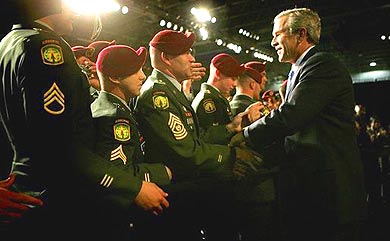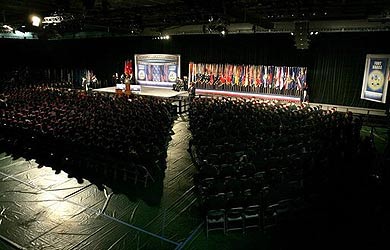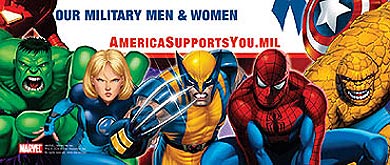President George W. Bush addressed his people on the Iraq’s war. Once again he said that this is a war launched to free the world from a terrorist organization that is accountable for the 9/11, 2001 attacks and for every attack occurred in the world ever since. To conclude, he invited all TV viewers to join the army. Here are some extracts taken from his speech.

For his sixth TV speech, broadcast at a television peak hour, George W. Bush did not choose the Oval Office, so much used by his predecessors, or his ranch in Crawford or an aircraft carrier, he chose the Fort Bragg military base in North Carolina.
Helped by prompters, he read his speech in front of 750 elite soldiers of the 82 Airborne Division and the Special Forces who, in case of an untimely demonstration of disapproval, could have been sent to a Military Appeal Court. He ostensibly carried the chain of a soldier killed in the battlefield given to him by the hero’s parents. Behind Bush, the U.S. flag completed the setting to highlight that, as president, he is also the commander in chief of the armed forces. In a word, a totalitarian regime’s typical setting.
Bush’s speech lasted 28 minutes sharp and was escorted by advertising slots purchased by the companies that help fund the regime. Politics is just another way to make money in the empire.
Currently down in all opinion surveys, Bush tried to answer the waves of criticism against the Iraq war and mobilize again the public opinion in relation to the conflict. Following his adviser Karl Rove’s suggestions, he went five times over the same letter available to him: the September 11, 2001 terrorist attacks. The trick is far too trite and not convincing but at least manages to silence the opposition.
“The troops here and abroad are waging a world war against terrorism. That war reached our coasts on September 11, 2001. The terrorists who attacked us and whom we’re fighting now, kill on behalf of a totalitarian ideology that hates freedom, rejects tolerance and condemns any opposition (...) After 9/11, I made a pledge to the American people: this country won’t wait for another attack. We’ll take this war to the enemy territory. We’ll defend our freedom (...) Our enemies can win only if we forget 9/11... if we abandon the Iraqis to the hands of men like Zarkaui... and the future of the Middle East to men like Bin Laden (...) They are trying to make our will shrink in Iraq, just as they tried to do it on September 11, 2001. But they won’t (...) After September 11, 2001, I told the Americans that the way to go would be hard but that we’d win. Well, it’s been hard and we’re winning”

The argument is pretty well known. It was developed when the public opinion still believed that Al-Qaeda had a base in Iraq under the protection of Saddam Hussein and that the tyrant of Baghdad stored mass destruction weapons to attack the United States. But today, after the denial of all these imputations, it’s simply ridiculous. However, Bush did not mind using it again because he knows that his opponents won’t dare to attack him in that field. That’s where the key of George W. Bush’s authority lies: by associating the whole leading class of his country and that of the allied countries with the fabrications about 9/11, he trims them down to impotence. Any opposition is liable to be connected with the myth of the world Islamist conspiracy upon which the blame of the attacks has been fastened. No event can already be classified as the president’s failure without being first presented by Bush as a terrorist attack from Bin Laden, Zarkaui and so forth.
“Work in Iraq is hard and dangerous. As most Americans do, I watch these violent and bloody images. Each one of those images is horrible - and suffering is real. I know that amidst this violence, Americans ask themselves: Is it worth the sacrifice? It is and it’s vital for the future security of our country”.
To those who have started to question the death of 1730 U.S. soldiers,
[1] in Iraq, the president’s answer was that their sacrifice was worth the while, invoking in this regard an imaginary cause: the fight against the anti-American world conspiracy that had not enough with its actions in New York, Washington and Pennsylvania but that “it continued to kill in Madrid, Istanbul, Jakarta, Casablanca, Riad, Bali and other places “. A paranoid answer whose advantage diverts the focus of two questions: What did U.S. soldiers go to look for in Iraq? How can the situation be improved by their laying down their lives?
One more time, Bush was brilliantly manipulating the weaknesses of the U.S. leading circles. The whole world knows damn well that there was not such immediate military threat to the U.S. security, neither from Iraq nor from any other power, but an economic threat stemming from the energy crisis. The decision to conquer Iraq was made in the framework of a broad plan intended to appropriate the hydrocarbons of the Arabian-Persian Gulf, with full knowledge of the human losses and chaos that it would entail. After Democrats and Republicans refused to give up the American way of life, that is, the squandering and exploitation imposed on the rest of the world, nobody else has been able to oppose the war.
Be that as it may, Bush explained at length to those who are worried about getting bogged down his plan for the “Iraqization” of the conflict: that is, training Iraqi repressive forces by U.S. advisors, deployment of technical advisors in local repressive units and the U.S. tutelage of the Interior and Defense Ministries. Nothing new for those who still remember Vietnam.
However, there was something new in his speech: Bush’s calling the people to support the troops in the front, urging the youth to join the army.
“On the occasion of the 4th of July [national] celebrations, I ask you to find a way to thank those men and women who are defending our freedom, hoisting our flag, by sending letters to our soldiers abroad or helping the family of any soldier living in the neighborhood. The Defense Department has created for this purpose a particular site in the internet: AmericaSupportsYou.mil. You can contact this site to get information about the activities of the people from your city in this sense. In the times where we are celebrating our freedom, let’s give our support to those men and women who are defending us all ” [2].

”To those who watch the television tonight, and are considering the possibility to join the military career, I say that there is no nobler service than that of our armed forces. We are free because all of our generations have had patriots eager to serve a cause greater than themselves. Those who are currently in service are occupying the place they merit among the great generation that wore the uniform of our country”.
All in all, the militarization of the U.S. society continues to be the only answer to the crisis of its economic model.
[1] that figure, established by the Defense Department, does not include the casualties of other U.S. Departments and Agencies (such as the CIA), the mercenaries paid by the Coalition and the private security agents as well as those of other Coalition states
[2] In these pages we had already dedicated a short article to the internet site George W. Bush is referring to.























Stay In Touch
Follow us on social networks
Subscribe to weekly newsletter